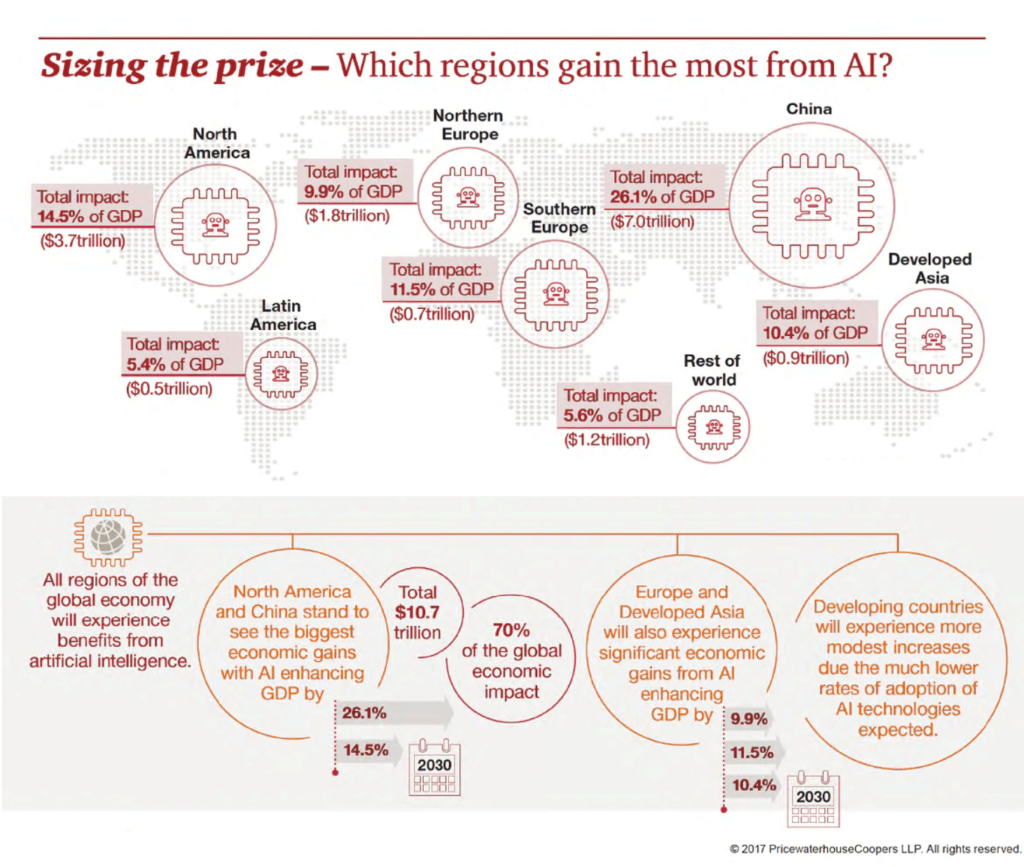Artificial intelligence (AI) is set to be the most important driver of business competitiveness with respect to productivity, profitability, and future growth. It enables businesses to boost performance by optimizing data-driven decision making, enhancing customer experience, and accelerating product innovation—to name a few. As a result, growth leaders are investing considerably in data science teams and deploying platforms that democratize AI at scale across their organizations.
AI Is Crucial For Business Competitiveness
As the engine of the current digital transformation reshaping industries around the world, the global AI market is expected to grow to $15.7 trillion by 2030 according to PwC’s Global Artificial Intelligence Study, which will account for a 14% boost in global GDP. It is no surprise that businesses looking to transform productivity and sustain a competitive edge need to adopt AI technologies for the potential growth and performance benefits.

Source: PwC’s Global Artificial Intelligence Study
Forrester Consulting’s thought leadership paper commissioned by IBM reported that high-growth firms—defined as companies with 10% or more annual revenue growth—are adopting AI initiatives at nearly double the rate of lower-growth peers. Moreover, based on Forrester’s online survey of 316 global decision makers in 2019, half of the surveyed high-growth firms are investing $10M or more in AI platforms this year, with an expected ROI of at least 500%.
AI-Driven Business Use Cases
AI comprises of a group of disciplines including expert systems, machine learning (including deep learning), natural language processing, and computer vision. These disciplines are combined to create intelligent systems that deliver value through business use cases.
Creating a personalized digital experience
Retailers use machine learning to personalize product and content recommendations, execute targeted marketing promotions, and implement dynamic pricing. These tactics increase customer engagement and improve conversion rate, boosting revenue.
In addition to personalized recommendations, businesses are using AI to personalize communication via automated systems such as chatbots. Chatbots use natural language processing to understand the intention and parameters of questions, so they’re able to respond appropriately through human language.
Enhancing quality management
Manufacturers use machine learning models in combination with sensors and other measuring equipment to automate and improve quality inspections, while complementing human effort. In addition to accelerating quality checks, this further protects the manufacturer’s reputation.
Service-based businesses also use AI to improve service quality. For instance, insurance companies use machine learning algorithms for underwriting, fraud detection, and pricing products dynamically.
Optimizing product placement
Retailers use computer vision techniques in combination with deep learning algorithms to optimize product placement, which can be the difference between profits and losses. By analyzing video heat maps, retail stores can pinpoint optimum spots for product placement, improving customer engagement and generating more sales.
Solving complex decision-making problems
Businesses in a variety of industries use expert systems to solve complex problems such as warehouse optimization, air freight scheduling and contract estimation. These systems use both facts and heuristics to solve problems with the highest level of human intelligence and expertise, improving decision quality and providing more accurate solutions efficiently.
Making future predictions
Businesses use AI to make financial forecasts with higher levels of accuracy. In addition to using machine learning to analyze structured historical data and predict the influence of external market factors, natural language processing is used to analyze unstructured data derived from sources like email texts, contracts, and financial statements for richer insights.
AI is also used to accurately forecast demand and optimize supply chain management. With machine learning algorithms, businesses are able to analyze real-time data coming from internal and external data sources. As a result, these businesses are able to adapt more efficiently to changes.
Improving workforce performance
By integrating AI into human resource practices, HR teams are able to make better decisions when recruiting, engaging, evaluating, and retaining talent. For instance, HR departments are able to screen candidate resumes more effectively with natural language processing by recognizing relevant information. With machine learning algorithms, HR managers are also able to analyze employee performance, generate valuable employee insights, and personalize training accordingly.
Advancing product innovation
AI allows businesses to understand their customers better. With machine learning, natural language processing, and computer vision techniques, businesses are able to analyze internal data, such as sales and video surveillance data, and external data, such as social media conversations, to extract valuable insights that advance product innovation.
Businesses are also using AI to integrate novel features. For example, automakers are building self-driving cars using advanced computer vision and machine learning algorithms.
In Summary…
AI enables businesses to boost productivity by automating repetitive, low-value tasks and allowing employees to focus on more strategic work. Implementing AI technologies also generates business value by increasing data-driven decisions, better understanding customers, and improving existing products. In this light, businesses that adopt AI technologies more effectively and rapidly are bound to outpace competition and sustain a competitive edge in the long run.